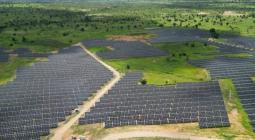Sustainable development: Ivory Coast bets on solar power in the East
At a meeting of the Council of Ministers on 28 February 2024, the Ivorian government approved a socio-economic development policy for the east of the country, focusing on sustainability. Households and economic activities in this part of Ivory Coast will be powered by photovoltaic solar energy.
Ivory Coast is putting sustainability at the heart of its development policies. The West African country is currently home to a number of renewable energy projects, with a view to decarbonising its electricity mix, which is still dominated by fossil fuels, particularly gas, which is used to produce over 73% of its electricity. In the east of the country, socio-economic development policy will focus more on sustainability, with the construction of a new photovoltaic solar power plant.
At the Council of Ministers meeting on Wednesday 28 February 2024, the Ivorian government approved a loan of more than 33 billion CFA francs (more than 50 million euros) from Kreditanstalt für Wiederaufbau (KfW), the German development agency, to help finance the implementation of the sustainable development project for eastern Ivory Coast, including the construction of a photovoltaic solar power plant in Sérebou.
With a capacity of 25 MWp, the solar farm planned near the town of Bondoukou will “improve Ivory Coast’s energy mix in favour of low-carbon energies, improve access to electricity in the towns of the Iffou region, and rehabilitate and reinforce the telecommunication and transmission equipment in the region’s source stations”, explains Amadou Coulibaly, spokesman for the Ivorian government.
Eastern Ivory Coast will soon be home to another photovoltaic solar power plant, this time built by an independent power producer (IPP). In Bondoukou, the Emirati company Amea Power will invest €56 million in a 50 MWp photovoltaic solar power plant as part of a public-private partnership (PPP). The plant will be connected to the grid of the Compagnie ivoirienne d’électricité (CIE), which will purchase its output for 25 years.
In addition to diversifying the electricity mix, these plants will increase Ivory Coast’s installed capacity. In 2022, West Africa’s second-largest economy had an installed capacity of 2,229 MW, 27% of which was generated by hydroelectric power stations. The Ivorian government aims to produce 42% of its electricity from renewable sources by 2030.
Cover photo: By AFRIK21



